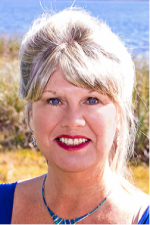 We wanted to get to know Nicole Evelina (NAIWE’s Novel Writing Expert) better, so last month we sat down with her. Here are some thoughts she shared with us.
We wanted to get to know Nicole Evelina (NAIWE’s Novel Writing Expert) better, so last month we sat down with her. Here are some thoughts she shared with us.
What does it mean to you that “everyone has a book in them”?
It’s a common saying and I truly believe most people do have a story they’d like to tell. They just don’t know how to go about it or feel intimidated by the process of writing an entire book. The good news is, you can start small with a short story, blog post, or poem. That may be all you need. If not, your skills will develop over time or you can decide if you want to hire a professional ghostwriter.
What would be a first step to transform corporate skills into creative abilities?
The most important thing is to just start. I would say how is two-fold: 1) get in touch with your inner creative — often the best way to do this is by thinking about what you enjoyed as a child. Did you write poems, stories, read, draw pictures, paint, etc.? Try bringing that back into your life without any pressure to produce. Just do what you enjoy. And 2) study the creative process. You can read books on it, search the internet, or take classes (in person or online). You’ll find that the process itself isn’t all that different from what we do in corporate communications. The key is to remember how much imagination plays a part in any creative pursuit. Anything you can do to stretch your imagination and get it really going again will help. After that, I’d advise joining local or online writing groups. You can learn a ton from those who are actively writing.
Will this feel like a revelation, a transformation, for the newbie?
It could be both. You may realize you have talents you never thought you possessed or your felt the need to repress. When you get back in touch with these talents or discover them, you’ll begin seeing yourself as creative person, an artist, if you will. That can impact every aspect of your life. I’ll give you a personal example. When I went into college, I didn’t think I was creative enough to be a writer. This is why I shied away from creative writing classes (that and I find it hard to write fiction on demand). But I nurtured my creativity in other ways—by writing stories for myself and my friends. Some are so bad that I treasure them. The day I shared one with my English advisor and he told me he thought I had talent was my revelation. The transformation came the more I practiced the elements of good fiction writing like description, dialog, and developing plot and character arcs. The first attempts were terrible, but it didn’t matter; I was doing them just for me. Eventually I realized I had gotten better, to the point that I could sustain longer works and I started to share them with friends and family. My life gradually became more and more about writing until now, when it is about half my day job and half about my writing. As time goes on, I hope to be able to embrace my writing as a full-time career. That path isn’t for everyone, but it is one path transformation can take.
——————
They say everyone has a book in them, or maybe some short stories or poetry. As a corporate communicator, you may have the ability to write but may not feel creative enough to break out of your business-minded mold. Niki Burgdorf, a 20-year veteran of business communication and a USA Today bestselling author who writes under the pen name Nicole Evelina, will show you how to tap into ideas and talents you didn’t know you had. Whether you want to write the next great American novel or just want to learn to be more creative, she will show you how to get started.
You can join in this conversation on October 24, at 7:00 pm eastern, when NAIWE will host a discussion on using your day job skills to increase your creativity. The cost for NAIWE members is only $10! Nonmembers can join for $30. Register today!

 NAIWE is always looking for those who excel and who may want to be an asset as a member of the Board of Experts.
NAIWE is always looking for those who excel and who may want to be an asset as a member of the Board of Experts.
 We wanted to get to know Ruth Thaler-Carter (
We wanted to get to know Ruth Thaler-Carter ( We wanted to get to know MJ Courchesne (
We wanted to get to know MJ Courchesne ( We wanted to get to know Suzanne Lynn Cheesman (
We wanted to get to know Suzanne Lynn Cheesman ( Now is a great time to think about attending one or two conferences over the next 12 months.
Now is a great time to think about attending one or two conferences over the next 12 months. We wanted to get to know Kristen Fischer (
We wanted to get to know Kristen Fischer ( We wanted to get to know Stephen Colwell (
We wanted to get to know Stephen Colwell ( We wanted to get to know Laura Pennington Briggs (
We wanted to get to know Laura Pennington Briggs ( We wanted to get to know Marcia Rosen (
We wanted to get to know Marcia Rosen (